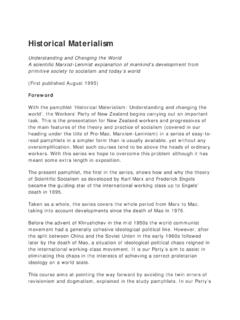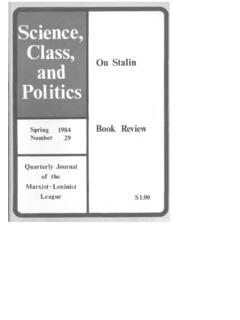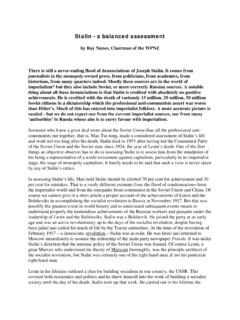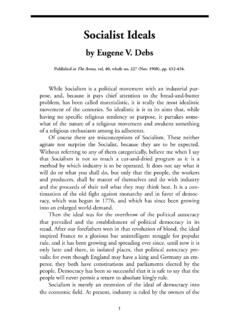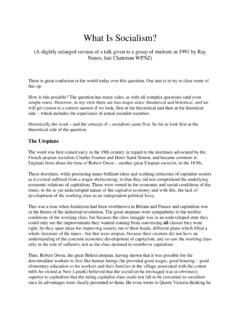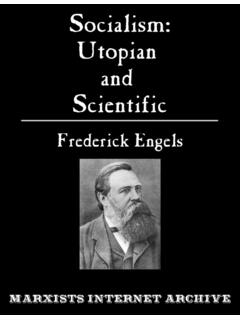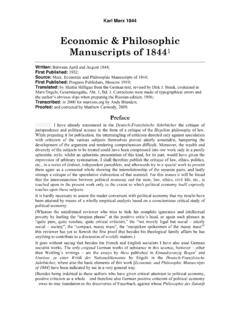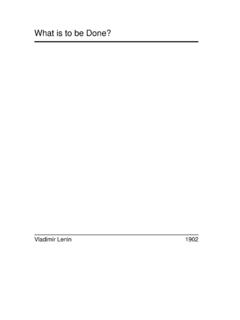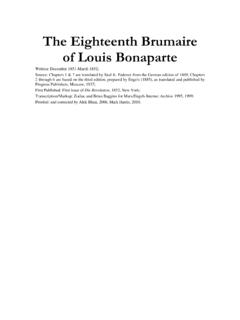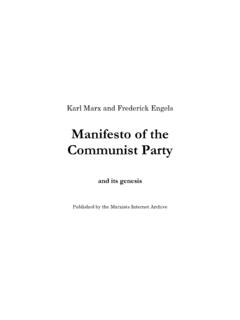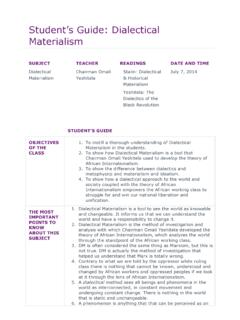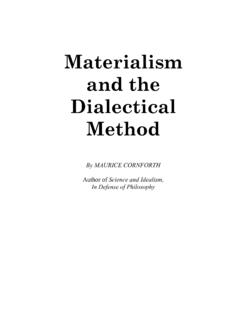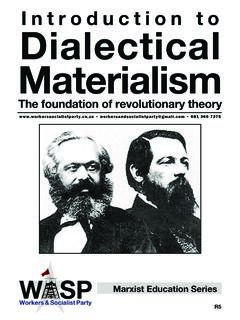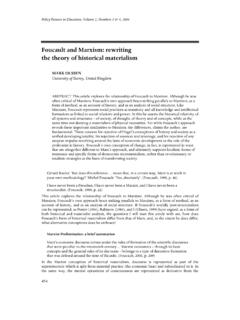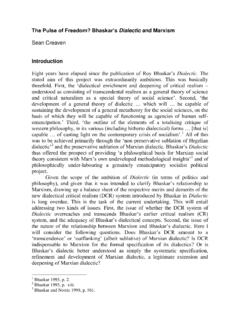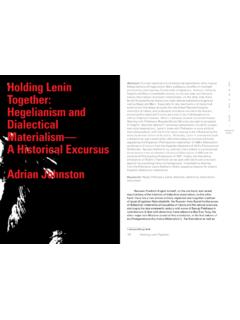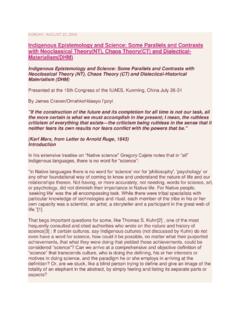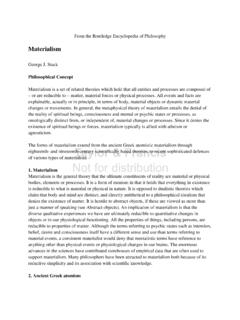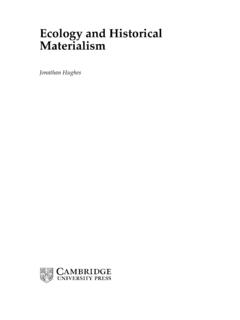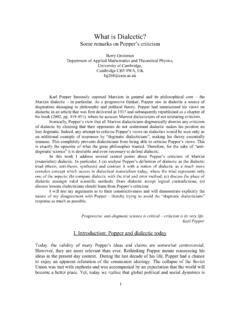Transcription of Dialectical Materialism - Marxists Internet Archive
1 Dialectical Materialism by Ray Nunes (Chairman of the former Workers Party in the 1990s) Note by Author The study of the Marxist theory of development, Dialectical Materialism , is essential to the building of a Marxist-Leninist party and hence for a solidly-grounded revolutionary movement. This essay on the subject forms part of an introductory study course on Marxist-Leninist theory. It was originally prepared in the late 1980s as part of a study course for a group interested in Marxism and in forming a new political party of the working class.
2 That was achieved, and it exists now as the Workers Party of New Zealand. The nature of the material studied, , philosophy, is more abstract than the other subjects in the course, and therefore presenting it in popular form as far as is possible, requires extra time in exposition. That is one reason for the greater length of this essay as compared to the previous studies. But there are additional reasons which need explanation. (1) There are important questions relating to the laws of dialectics and their application that arose during and since the ideological struggle of the 1960s against modern revisionism, relating to Stalin s pamphlet Dialectical and historical Materialism and also to Mao Tse-tung s essays on philosophy, particularly On Contradiction and On Practice.
3 To seek the best exposition that would aid both the beginner in Marxist philosophy and the more experienced student of the subject, the author found it necessary to compare the basic philosophical writings of Marx, Engels, Lenin, Stalin and Mao from the point of view of establishing a correct Marxist-Leninist standpoint. This naturally made for lengthy treatment. It became apparent that (a) Stalin had made errors that resulted in shortcomings in his leadership; and (b) Mao had overall made important positive developments to philosophy and had a much deeper understanding of it, than Stalin.
4 (2) The question of how to utilise revolutionary dialectics in the practical work of a Marxist-Leninist party and indeed of the individual party member is dealt with much more fully and explicitly by Mao than by any other, even by Lenin, although Mao clearly has studied Lenin and drawn important lessons from him. This too, demanded extra space. (3) Because it is now extremely difficult to obtain copies of Mao s two basic pamphlets On Contradiction and On Practice the author felt it necessary to include certain essentials of these pamphlets to enable their use in practice.
5 (4) Little space is devoted to Enver Hoxha s crude attacks on Mao as a philosopher. This is reserved for a later study and in order not to make an already long essay longer by rebutting here the stupidities and distortions to which Hoxha descends. The Basic Question of Philosophy Dialectical Materialism is the philosophy of Marxism-Leninism. Not only is it the sole outlook which gives a scientifically-based understanding of the world around us; it also enables us to understand what brings about changes in that world - including human society and in people s thoughts about it.
6 That is the first important thing to note. The second important thing is that a proper understanding of Dialectical Materialism can enable a workers political party to guide its practical work correctly in the process of changing the world. We shall deal with these two aspects in order. Philosophy - the study of the development of human thinking about the natural world and man s place in it - has a fairly long history. But in the middle of the nineteenth century it underwent a revolution at the hands of the two great thinkers and founders of scientific socialism, Karl Marx and Frederick Engels.
7 Engels wrote an account of the development of their philosophy in his pamphlet: Ludwig Feuerbach and the End of Classical German Philosophy. (The word end is used in the sense of outcome .) He writes: The great basic question of all philosophy, especially of more recent philosophy, is that concerning the relation of thinking and being? The question of the position of thinking in relation to being, a question which by the way, had played a great part also in the scholasticism of the Middle Ages, the question: which is primary, spirit or nature - that question, in relation to the church, was sharpened into this: Did God create the world or has the world been in existence eternally?
8 The answers which the philosophers gave to this question split them into two great camps. Those who asserted the primacy of spirit to nature and therefore, in the last instance, assumed world creation in some form or other - and among the philosophers, Hegel, for example, this creation often becomes still more intricate and impossible than in Christianity - comprised the camp of idealism. The others, who regarded nature as primary, belong to the various schools of Materialism These two expressions, idealism and Materialism , originally signify nothing else but this ?
9 (1) Most of the earlier Greek philosophers were materialists in their outlook. Important contributions to Materialism were also made by English philosophers, particularly Francis Bacon, John Locke and Thomas Hobbes, to which group Marx gave the credit of being the fathers of modern Materialism . The French materialists of the eighteenth century were much influenced by the British school. In the sphere of ideas they helped to prepare the ground for the great French Revolution of 1789-93. Each of these schools was opposed by philosophical idealists, particularly (but not only) by theologians, advocates of religion.
10 So it is today with Marxism. Up to the mid-nineteenth century the religious - and most of the secular - authorities propagated the idea that the bible, both the old and the new testaments, were the founts of all knowledge. The age of the earth was held to be about six thousand years. The nature of the wider universe was unknown. Today an immense array of factual evidence has been accumulated by the physical sciences - particularly astronomy, geology, palaeontology, chemistry and physics, conclusively proving that the age of the earth is in the vicinity of thousand million years, while the age of the universe is approximately 15 thousand million years.
